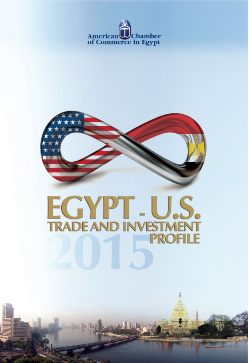 Egypt and U.S. 2015 Investment and Trade Profile via AmCham Egypt
Egypt and U.S. 2015 Investment and Trade Profile via AmCham Egypt
Round Table: Making the Most of U.S. and Foreign Investment in Egypt
American Security Project hosted a round table of delegates from the American Chamber of Commerce in Egypt to discuss the current state and projected future of U.S. and foreign investment in Egypt. With a population of over 90 million people, Egypt boasts more than a large consumer base. Egypt represents the nexus of the Middle East, Africa, and the Mediterranean, opening Egypt’s market would also increase the visibility of these markets to the European and Asian markets to further develop interdependence throughout the global market.
One topic central to the discussion concerned the development of Egypt’s energy sector. As the largest consumer of oil and gas in Africa, Egypt requires additional sources of energy production. Accordingly, the el-Sisi administration seeks to prioritize and improve turbine technologies through the privatization of electricity production and transmission with generous set rates offered to companies specializing in renewable energy production. Although Egypt remains in the process of formalizing an emergency energy plan, the government is making the necessary efforts to encourage the diversification of the energy sector.
Following the Egypt Economic Development Conference in March 2015, there has been evidence of optimism in investor outlook. The conference brought over 1,700 investors together to seal over USD 38.2 billion in investments. With investments in the manufacturing, agricultural, and energy sectors, this renewed confidence in the Egyptian economy provides the initiative for comprehensive political, social and economic reforms to maintain the participation of these sources. However, investments will only continue if the public is content with the economic system that is put in place.
Rather than solely relying on a trickle-down methodology, Egypt requires an economic model with the public at its center. In order to have a more trusting public, economic progress will also depend on systematic improvements that would encourage a more transparent government with accountable representatives. The country’s economic progress needs to rely on cooperation on both macro and micro fronts so that every constituent is factored into the final decision and given a stake in the prosperity. Although it seems easy to say that Egypt requires an accessible economy to incite economic stability, there will also need to be concrete infrastructural improvements that will allow policy to translate into action and practice. With attention shifting towards the Suez Canal Area Development Project—a project that would provide opportunities of employment while also doubling national revenue from an expanded transit system, every sector of society would have a role in the economic development of the country.
According to the Organization for Economic Cooperation and Development, small and medium enterprises are also the key to Egypt’s economic improvement. SMEs represent 90% of businesses, 80% of GDP, and 75% of employment. The question is, how does Egypt not only persuade investors to allocate funds towards SMEs but also ensure these investors that there will be an acceptable profit margin? With continued economic growth (up 4.2% in the past year), the success of SMEs would encourage investors to outsource and offshoot their businesses within Egyptian borders further providing economic opportunities for an underemployed public.
Although the U.S. government provides over USD 1.5 billion in foreign aid to Egypt, in order to be a more effective economic partner, the U.S. should encourage Egypt’s own role in keeping their economy afloat. The major conclusion: in order to stimulate a stagnant economy, there needs to be an increase in the allocation of foreign direct investment towards small business enterprises. To ensure economic solvency, Egypt will continue to benefit from international aid and foreign investment to create fiscal opportunities, but national stability will also benefit from a renewed emphasis on an economically, politically, and socially empowered public.






[…] Round Table: Making the Most of U.S. and Foreign Investment in Egypt […]
[…] Round Table: Making the Most of U.S. Foreign Investment in Egypt Riza Kumar American Security Project hosted a round table of delegates from the American Chamber of Commerce in Egypt to discuss the current state and projected future of U.S. and foreign investment in Egypt. With a population of over 90 million people, Egypt boasts more than a large consumer base. […]
[…] Making the Most of U.S. and Foreign Investment in Egypt […]